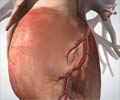Among those given to depression, gender could indeed make a difference. While gloominess means a higher risk of heart disease, the probability is insignificant among men.
Among those given to depression, gender could indeed make a difference. While gloominess could generally mean a higher risk of heart disease, the probability is insignificant among men, Canadian researchers say.
The study, Depression and Risk of Heart Disease, was conducted over a 12-year period. It found that among people aged 40 or older without heart disease in 1994/1995, 19 per cent of men and 15 per cent of women had developed or passed away from heart disease by 2006/2007.There were 4, 948 respondents in the study, which was released Wednesday.
The study found that 16.8 per cent of women and 10.9 per cent of men had experienced depression. Women who were depressed were significantly more likely to have a heart disease event than those without the condition. For men, that risk was insignificant.
Study author Heather Gilmour said women had a 70 per cent greater risk of developing heart disease if they had been depressed.
But she said for men, the increased risk was less than one per cent.
However, the researchers refuse to make a causal relationship between depression and heart disease.
Advertisement
Women who reported being depressed were less likely to have never been drinkers, to have high blood pressure, to be using hormone replacement therapy and to have a high income.
Advertisement
The second view is that depression leaves its victims so bereft of joy or pleasure that they neglect their health and may forget to take medications, like those that control high blood pressure. As a consequence, they become more vulnerable to heart disease.
Dr. Nancy Frasure-Smith of the Montreal Heart Institute had followed 222 patients who had suffered heart attacks and found that those who were depressed were four times as likely to die in the next six months as those who were not depressed. Depression turned out to be as good a predictor of imminent death from heart disease, primarily arrhythmias, as previous history of heart attacks or poor functioning of the heart, she said.
When Dr. William W. Eaton of the Johns Hopkins School of Hygiene and Public Health in Baltimore followed up on 1,551 people in the Baltimore area who were free of heart disease in 1981, he found that those who were depressed were four times as likely to have a heart attack in the next 14 years. Depression, in his study, carried as grave a risk of heart disease as elevated levels of blood cholesterol.
But how might depression cause heart disease? One possibility is that the condition itself brings about biochemical changes that can injure the heart. Researchers have found several distinctive physiological changes in depressed patients. Their hearts beat faster, even at night when they are sleeping, and their heart rhythm does not adjust well to changes in activities, like walking and then sitting down. They tend to have high blood pressure, and their blood may clot more easily. The result is that the heart and blood vessels are under increased stress.
Dr. Richard Veith, a US expert said he found that depressed patients had levels of norepinephrine in their blood 30 percent higher than those of people who were not depressed.
This stress hormone increases blood pressure and speeds up the heart rate, he noted, increasing the workload of the heart. And, he added, ''if the coronary arteries are narrowed, that could put the heart at risk.''
Dr. Philip Gold, also of the US, said that many depressed patients were, paradoxically, in a constant state of hyperarousal.
Although they are sad and say they feel lethargic, their stress hormones are seething. So they sleep less or wake early in the morning, they lose their appetite and they secrete too much cortisol, a stress hormone.
Cortisol, production of which Dr. Gold has found to be stepped up in depressed patients, can exacerbate arrhythmias, the erratic heartbeats that often precede sudden death. Cortisol also decreases the secretion of growth hormone, a change that shifts the body's cholesterol toward the dangerous low density lipoproteins and away from the high density lipoproteins that protect the blood vessels. Another effect of cortisol is to spur the accumulation of abdominal fat, which enhances the risk of heart disease.
But lot more research has to be done before causally linking the two problems, it is felt.
Regardless of cause, the combination of depression and heart disease is associated with increased sickness and death, making effective treatment of depression imperative.
Source-Medindia
SRM














